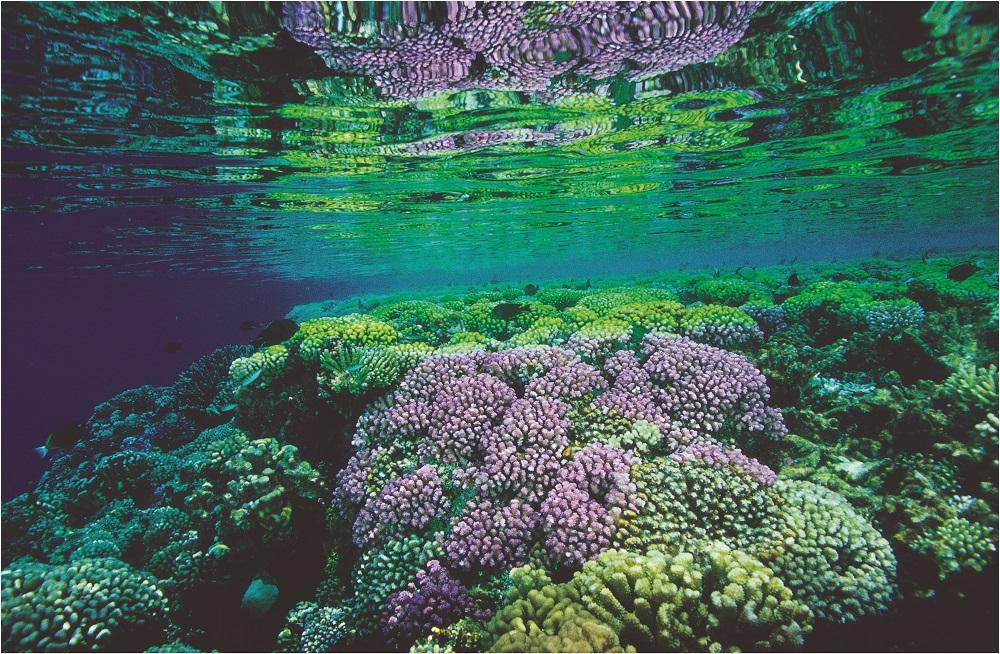
GRET Coastal and Reef Socio-Ecosystems
The GRET “Coastal and Reef Socio-Ecosystems” focuses on coastal and shoreline systems, with particular attention to coral reefs and temperate biogenic and rocky reefs. Within these systems, the GRET investigates environmental, ecological, evolutionary, and societal dynamics. Research explores relationships between organisms, communities, ecosystems, and environmental changes; mechanisms of interaction between organisms (e.g., symbiosis, chemical mediation, competition); functional ecology; ecological processes; and socio-ecosystem management.
Coordinators: Valeriano Parravicini, Eric Feunteun
Main Research Areas
- Interactions Between Coral Reef Organisms
This research area examines interactions among coral reef organisms to better understand the role of chemical interactions in shaping reef structure and function, as well as the impact of environmental changes on these chemical processes.
Maggy Nugues, Camille Clerissi
- Coral Reefs and Environmental Change
This axis aims to describe, understand, and anticipate the changes coral reef organisms will face in the coming years due to climate and anthropogenic pressures. The findings will provide a solid scientific foundation for conservation, restoration, and coastal planning decisions.
Suzanne Mills, Serge Planes
- Functional Ecology of Coral Reefs
This axis conducts high-resolution studies at both local and global scales to better understand the factors driving coral reef functioning (e.g., biogeochemical cycles, matter and energy flows), assess their vulnerability to human and climate pressures, and investigate their resilience capacity.
Valeriano Parravicini, David Lecchini
- Management of Reef Socio-Ecosystems
This axis primarily seeks to improve understanding of key factors and influential internal links within the social ecosystem of coral reefs, laying the groundwork for effective decision-making.
Eric Clua
- Ecology of Coastal and Littoral Aquatic Landscapes
This approach uses geospatial modeling of aquatic landscapes—from intertidal zones to coastal underwater environments—to analyze and quantify habitat diversity and understand their responses to environmental changes at large scales and high resolution. It relies on image acquisition methods including satellite imagery, aerial drones, topobathymetric LiDAR (up to 75 m depth in clear waters), side-scan SONAR, single- and multi-beam echo sounders, and scuba diving surveys.
Antoine Collin, Eric Feunteun
- Aquatic Landscapes and Fish Life Cycles
This research theme explores the links between landscape characteristics, architecture, and complexity, and the population dynamics of fish communities in temperate aquatic ecosystems along the land-sea continuum. It focuses on migration and dispersal mechanisms in fish species such as diadromous and holobiotic marine migrators and examines the relationship between habitat quality and extent and biological traits (life history, behavior, trophic role).
Eric Feunteun, Antoine Collin
- Art-Science Representation of Coastal Landscapes
This innovative, transdisciplinary approach explores complex landscapes identified in thematic axis 1 and develops new representations of their state and evolution. A dialectic—and sometimes synergy—emerges between scientific prospects focused on continuity and precision, and artistic percepts creating aesthetic (sensory) monuments through 2D imagery and 3D modeling. These hybrid representations address societal and geographical issues such as coastal and marine planning, human positioning along the land-sea continuum in the context of sea-level rise, intensifying storms and cyclones, and ecosystem renaturalization. This art-science convergence gives rise to scientific publications in geophilosophy, in situ and digital artworks, and augmented and virtual realities of coastal and marine risks.
Antoine Collin
List of Researchers / Research Units and Associated Websites
- CRIOBE - https://www.criobe.pf
Camille Clerissi, David Lecchini, Suzanne Mills, Maggy Nugues, Valeriano Parravicini, Serge Planes
BOREA, BIOPAC Team - https://borea.mnhn.fr/